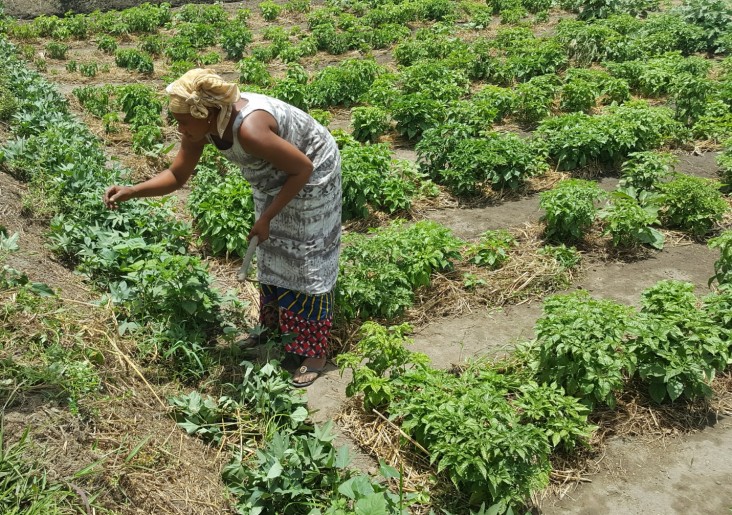Speeches Shim

August 2018 — Djenabou Camara is a 30-year-old mother of five children and a member of the Nèma Gardeners Association in the prefecture of Boffa in Guinea. She earns most of her money from growing vegetables on a hectare of land allocated to her by the association. She decided to go into petty trade to help support the family.
“I used to sell rice to help my husband take care of the family. But rice processing was too much work for very little profit,” said Camara.
The Nèma Gardeners Association has 20 members, including 15 women. The members cultivate a variety of crops on 26 hectares of farmland. They are among 450 farmers, 262 of whom are women, benefiting from USAID’s Improved Livelihoods and Agricultural Development Project in Boffa that provides support in basic agriculture skills, entrepreneurship, the introduction of improved technologies and seed varieties, and food marketing. The project, which began in 2017, is helping them to develop 20 of the 26 hectares of the association’s farmland.
Before the project began in Boffa, agricultural productivity was very low due to rudimentary farming techniques and poor farming practices among vegetable gardeners, 90 percent of whom are women.
In 2017, USAID trained members of the Nèma association in better farming practices including timely planting, proper spacing and row cropping and later introduced a new hybrid of legume that can be harvested up to four times a year. The project also provided the association with watering cans, rakes, hoes, motor pumps and reservoirs to facilitate access to water during the dry season, and introduced new farming techniques like making square shape mounds that can easily retain water.
“Watering our farms is a problem between mid-March and mid-April when the dry season is at its peak. But the new mound technique and the motor pumps have solved this problem,” said Camara.
Applying the skills she learned from the training, Camara has improved her farm with better practices. She used to plant only eggplant, but with the new hybrid vegetable seeds and the intercropping techniques, she now grows okra and pepper as well. She harvested four bags of vegetables in June 2018, compared to one and a half to two bags before the project intervened.
“I look forward to making good profit from now on,” said Camara. “My farm yield has increased. We sell a 50-kilogram bag of vegetables for 350, 000 Guinean francs. If I can harvest up to four bags every month with the new seeds, imagine the change this will bring in my life.”
Scheduled to end in December 2019, the Improved Livelihoods and Agricultural Development Project — which is part of the U.S. Government's global hunger and food security initiative, Feed the Future — works to mitigate second-order impacts of Ebola in Guinea by creating more economic resilience in mining communities.
LINKS
Follow @USAIDGuinea, on Facebook, on Flickr

Comment
Make a general inquiry or suggest an improvement.